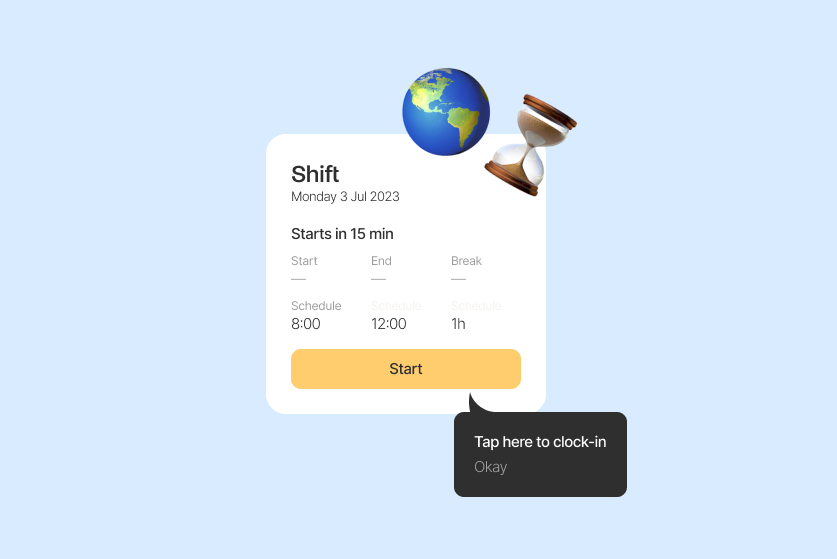Streamlining Retail Chain Operations with HR Software
![]()
Did you know that the average turnover rate in the retail industry can reach up to 60%, significantly higher than the national average for other sectors? Managing a large and diverse workforce across multiple locations can be challenging. Retail chains face the unique task of ensuring operational efficiency while maintaining employee satisfaction. HR software can play a pivotal role in addressing these challenges by streamlining operations, improving employee engagement, and ensuring compliance. In this article, we’ll explore the power of HR software and how it can help retail chains operate more effectively, with a particular focus on industries like nail salons, where workforce management is essential.
The Challenges Retail Chains Face in Workforce Management
Retail chains, with their large networks of locations and varying employee needs, face several key workforce management challenges:
- Multiple Locations and Workforce Diversity:Managing employees across different locations, each with its unique staffing requirements, can be overwhelming. It involves coordinating shifts, overseeing training, and ensuring consistent performance across the board.
- High Turnover Rates:According to the National Retail Federation (NRF), retail turnover rates can reach up to 60%, much higher than other industries. This high turnover places a burden on HR departments to constantly recruit, onboard, and train new employees, which can strain resources and increase operational costs.
- Complex Scheduling: With varying hours of operation, demand fluctuations, and compliance with labor laws, scheduling becomes a nightmare for retail managers. Scheduling errors can lead to understaffing, overstaffing, and increased overtime costs.
- Payroll and Compliance: Ensuring payroll accuracy and maintaining compliance with tax laws and labor regulations across different states or countries can be a daunting task, especially when dealing with diverse job roles, pay scales, and incentive systems.
How HR Software Addresses These Challenges
HR software is designed to address these challenges and simplify complex workforce management tasks. Here’s how it works:
- Centralized Employee Management: HR software allows retail chains to centralize employee data, making it accessible to managers across all locations. This centralization makes it easier to track employee performance, availability, and work history.
- Automated Scheduling: HR software tools automate shift scheduling, taking into account employee availability, labor laws, and peak business hours. This ensures that each store is properly staffed without violating labor laws or incurring unnecessary costs
- Streamlined Payroll and Compliance: By automating payroll calculations and tax deductions, HR software eliminates errors and ensures compliance with regional labor laws. It also allows for easy tracking of tips, bonuses, and commissions, which is especially beneficial for service-based industries like retail and nail salons.
- Employee Engagement and Retention Tools: HR software includes tools to track employee performance, provide feedback, and offer professional development opportunities. By implementing performance review systems and career growth pathways, HR software can help reduce turnover and improve employee satisfaction.
Key Features of HR Software for Retail Chains
Retail chains benefit from a variety of HR software features that optimize daily operations and workforce management:
- Time and Attendance Tracking: HR software automates time tracking, helping ensure that employees are compensated fairly for the hours they work, including overtime and breaks. This feature also prevents time theft and ensures accurate payroll processing
- Self-Service Portals: Employees can access their schedules, view payroll information, and update personal details via self-service portals, which reduces the administrative workload on HR teams.
- Advanced Reporting and Analytics: HR software allows managers to generate detailed reports on employee performance, labor costs, and staffing needs. These insights can be used to make data-driven decisions about future hiring, scheduling, and training requirements.
- Mobile Access: HR software often comes with mobile apps that enable employees and managers to access scheduling and payroll information on the go, making it easier for employees to request time off and for managers to approve shifts remotely.
Benefits of Implementing HR Software in Retail Chains
The implementation of HR software can offer numerous benefits to retail chains:
- Improved Operational Efficiency: By automating administrative tasks, HR software allows managers to focus on core business functions such as customer service and inventory management. According to a report by McKinsey, automating HR processes can reduce administrative costs by up to 30%.
- Cost Savings: HR software can reduce errors in payroll, tax calculations, and compliance, leading to significant cost savings. Additionally, with optimized scheduling, retail chains can reduce labor costs by ensuring that the right number of employees are scheduled for each shift.
- Enhanced Employee Experience: Employees benefit from a more transparent and efficient scheduling system, faster payroll processing, and self-service tools that reduce their need for HR involvement. This leads to higher employee satisfaction and a more engaged workforce.
- Scalability: As retail chains expand, HR software makes it easier to scale operations without increasing HR staff. It provides the flexibility to add new locations, employees, and roles without overwhelming the existing HR infrastructure.
Sectors Benefiting from HR Software in Retail Chains
While HR software is beneficial across various retail sectors, let’s highlight some specific industries where it plays a critical role.
Nail Salons
Nail salons, with their unique staffing needs and service-based business models, can greatly benefit from HR software. Key benefits for nail salons include:
- Time-Saving Features: HR software automates the scheduling of nail technicians, ensuring that the most qualified staff are available during peak hours, reducing the risk of understaffing or overstaffing.
- Payroll and Tip Management: Managing tips and commissions is a common challenge in the beauty industry. HR software allows nail salons to automatically calculate tips, commissions, and hourly wages, ensuring accurate payroll and reducing administrative errors.
- Improving Employee Retention: Nail salons often experience high turnover rates. By using HR software to track employee performance, provide feedback, and offer training opportunities, salons can improve retention and employee satisfaction.
Other Sectors
- Apparel and Fashion Retailers: HR software can help manage inventory and HR processes simultaneously, with real-time insights into staffing needs during high-demand periods.
- Grocery Chains: Automating compliance with labor laws, managing part-time and seasonal workers, and scheduling for large teams across various locations can all be streamlined with HR software.
- Beauty and Wellness: From spas to fitness studios, HR software helps manage schedules, employee certifications, and payroll for diverse service teams.
Real-Life Examples of Retail Chains Using HR Software
- Case Study 1: A large retail chain with hundreds of locations implemented HR software to streamline scheduling and payroll. By automating these tasks, they reduced scheduling errors by 25% and saved an estimated $1.5 million annually in administrative costs.
- Case Study 2: A popular fashion retailer reduced employee turnover by 15% after introducing HR software that tracked performance, enabled career development opportunities, and offered employee feedback tools.
How to Choose the Right HR Software for Your Retail Chain
When choosing the right HR software for your retail chain, consider the following factors:
- Identify Your Needs: Understand the specific challenges you face and choose a solution that addresses those needs, such as scheduling, payroll, and compliance.
- Integration Capabilities: Ensure the HR software integrates seamlessly with your existing systems, such as payroll providers and inventory management tools.
- User-Friendliness: The software should be easy for both HR staff and employees to use, with minimal training required.
- Vendor Support and Scalability: Choose a vendor that offers excellent customer support and a solution that can scale as your business grows.
Conclusion
HR software can significantly streamline operations in retail chains, addressing pain points such as complex scheduling, payroll management, and employee retention. By automating key processes and providing data-driven insights, HR software enables retail chains to operate more efficiently, reduce costs, and improve employee satisfaction. As the retail industry continues to evolve, the adoption of HR software will become increasingly essential for maintaining a competitive edge.
How much could your retail business save in time and costs by implementing the right HR software solution? It’s time to explore how this powerful tool can transform your operations and enhance your workforce management strategy.
Talk to us to find out how Zelt simplifies HR, payroll, and benefits for growing teams.

